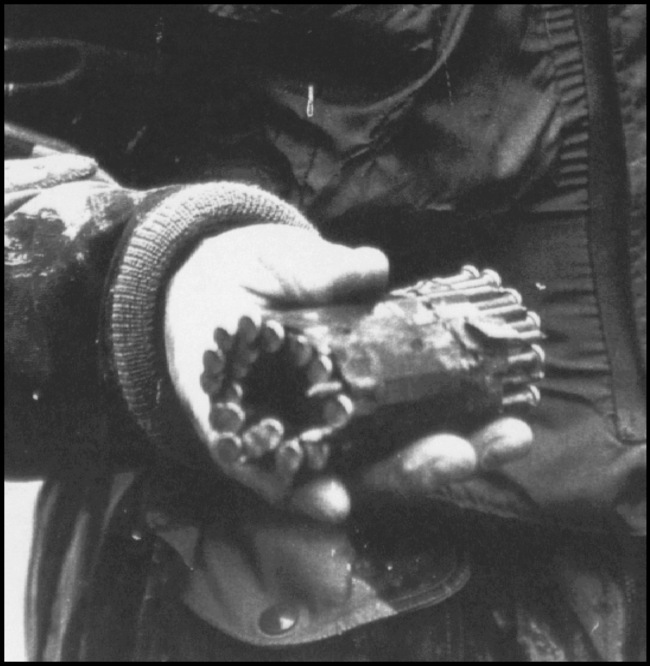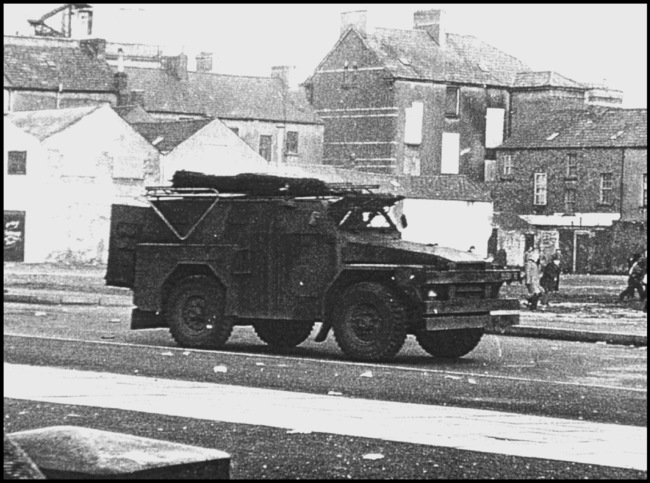 - Betsy "Pepsi" Maher photo
- Betsy "Pepsi" Maher photo
It was from an old Rudge, an English company that also made motorcycles like alot of the companies did back then - here in N.Y.C. I see alot of Triumph and BSA bicycles with the exact same logos as the more preferable motorcycles.
Then I remembered the hand in the Rudge logo was nothing less than the very dramatic "Red Hand of Ulster". It makes you think of grainy black and white photos of IRA bombings, political murals on buildings, and little kids playing by armored vehicles in the cobblestone streets of Ireland.
And anyone growing up listening to bands (or, say, reading the newspaper) like Sham 69 and Stiff Little Fingers, and of course U2 (before they went kooky, as I've mentioned before) knows that Ireland is full of a chaotic and violent political history.
 - Clive Limpkin photo
- Clive Limpkin photo
Rudge actually started off as a bicycle manufacturer in the late 1800s but then made motorcycles from 1911 to 1946. The bikes were originally made in Coventry, but the ones that say Nottingham were built afterwards, once Raleigh had purchased the company. So why the Red Hand? Neither of these two cities are in Ireland, so maybe it was just a stylistic move - like the Ferrari horse or the BMW spinning propeller logo? The truth was actually that the family who founded the company had its roots in Northern Ireland and anti-climactically used it for that reason.
And they did make some nice motorcycles...

 - the Rudge Ulster
- the Rudge UlsterBut the actual story of the Red Hand is no less dramatic than you might hope for, yet maybe a bit more appropriate for a Saturday afternoon TV movie. In Irish pagan times the Kingdom of Ulster had no rightful heir, according to one myth. As in any such situation, a boat race was the sensible way to solve the problem, and it was decided that "whosoever's hand is the first to touch the shore of Ulster, so shall he be made the king". One ambitious contestant, who saw that he was losing the race, cut off his own hand and threw it to the shore, winning the kingship. The red is of course the blood covering the hand, as you might have guessed.
Another legend tells the story of two giants fighting each other, one of whom had his hand cut off leaving a bloody red handprint on the rocks (One can only speculate that if the sword had tragically struck some other part of the giant's anatomy today's topic might be the Red Penis of Ulster).
In doing the research on this, my source pointed out that both of these stories are most likely fabrications - "particularly the one about the giants"- but I feel that they could probably be true.
There's much more to the history of Ulster, however (not a city, but one of four Irish provinces), and the Red Hand as well, largely involving disputes between Protestants and Catholics, the IRA, and resistance to British rule. Volumes have been written on this topic, but it's been the subject of several rock 'n' roll songs as well. The B-side of Sham 69's first single "I Don't Wanna" was called "Ulster" and warned that "the troubles" (the name given to this period of political turmoil) would continue "for a few more years - so when ya throw them bricks, don't ya cry no tears..."

Unexploded nail bomb - recovered during or after riot in 1971.
And Stiff Little Fingers' second single "Alternative Ulster" commented more personally on life as the Irish band saw it. (They had actually been encouraged to write about their perspectives on The Troubles by Marxist journalist Gordon Ogilvie)

"Take a look where you're livin'
You got the Army on the street
And the RUC dog of repression
Is barking at your feet
Is this the kind of place you wanna live?
Is this were you wanna be?
Is this the only life we're gonna have?
What we need is...
An Alternative Ulster"
(RUC = Royal Ulster Constabulary, aka the police)
Most famously, "Sunday Bloody Sunday" by U2 lamented the tragic massacre on the 30th of January in 1972, when twenty-seven unarmed civil rights protesters were shot by British Army troops while on a march. Fourteen died, seven of whom were teenagers. Several others were injured, two of which were run down by armored personel carriers.

BELOW - Mural of Father Edward Daly waving a white handkerchief while trying to help Jack Duddy, mortally wounded during the massacre...


Giants, kings, machine guns, bloody hands, blood on other people's hands, motorcycles, and punk bands - funny how such an innocuous little image on a bike can be so full of life (and death)....
- Karl Monroe

Great Article!
ReplyDeleteI love Sham 69
ReplyDeleteHULKA
ReplyDeleteWOW...It lays it all out there,,, doesn't it?..
ReplyDelete